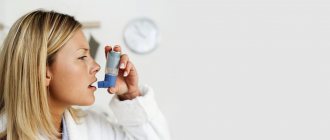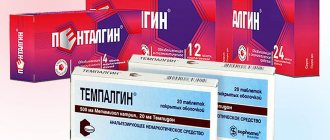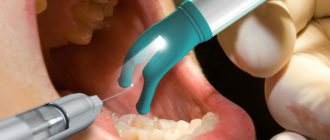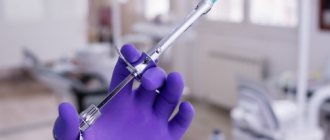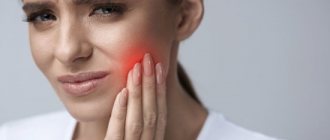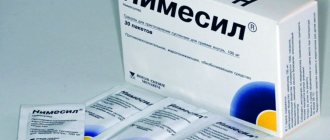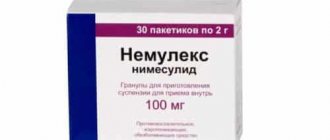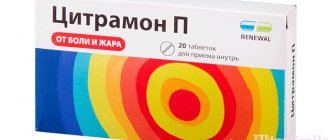Contraindications
The drug has a large list of contraindications that you should familiarize yourself with before taking it:
- stomach ulcer;
- hemorrhages of the gastrointestinal tract;
- individual susceptibility to the constituent components;
- bronchial asthma;
- kidney and liver diseases in severe form;
- hyperkalemia;
- diseases of the heart and blood vessels;
- persons under 18 years of age;
- period of childbearing and breastfeeding.
If pain of any origin appears, you should initially consult with a specialist who can prescribe the correct treatment.
There are some conditions in which the use of the medication is possible with great caution: high blood sugar, viral hepatitis, epilepsy, elderly patients.
special instructions
Shelf life – 24 months. Should be kept in a dark and dry place at room temperature.
The drug has a number of proven analogues. These include: Ibuprofen, Amizon, Paracetamol. Before making a replacement, you need to consult a specialist.
Concomitant use of the drug with other drugs that contain paracetamol and NSAIDs is not allowed.
If the patient takes the medicine for more than a week, then it is necessary to monitor the value of peripheral blood and liver function.
Since caffeine is present in the composition, it can affect the nervous system, having an stimulating or, on the contrary, inhibitory effect.
Treatment of aching pain in teeth
Only a dentist can determine the exact cause of aching toothache and provide proper treatment. Analgesics and folk remedies temporarily alleviate the condition before visiting a doctor.
Aching toothache after treatment, filling or grinding
Usually, after grinding of pulpless teeth, pain does not bother you, and if they are “alive”, then the discomfort goes away after 3-5 days.
Painful sensations can also occur after treatment of caries, pulpitis, as a reaction to the impact of a drill or composite material. The pain may persist for up to 2 weeks. Usually occurs when pressure is applied to the surface of the tooth or when hard food enters. During this time, tertiary dentin is formed under the filling, protecting the pulp, and after that the aching toothache no longer bothers you.
Normally, such pain fades gradually. But if a reverse reaction occurs, that is, the pain intensifies, you need to consult a doctor. The cause may be an inflammatory reaction due to improper filling or sanitation of the canal. With untreated caries, the pathological process will spread to the pulp and provoke its inflammation. In both the first and second cases, it is necessary to consult a doctor again for canal sanitation.
Before contacting a doctor, analgesics, for example, Naiza 100 mg tablet, will help relieve pain.
IMPORTANT! It should be remembered that you should not take more than 4 tablets per day, for children over 12 years old - no more than 3 times.
The duration of action of the analgesic is 4 hours. For children under 12 years of age, paracetamol syrup is recommended.
Normally, aching pain in a tooth subsides within 1-2 days after treatment.
If there is nothing at hand and the aching pain is unbearable, you can use acupressure. It reflexively connects acupuncture points on the face or hand with the corresponding area of the oral cavity.
- He-gu points are located in the cavity between the thumb and index finger of the hand. For pain on the right, massage the left hand and vice versa. The movements should be pressing. The finger of the opposite hand is moved up and down for 3 minutes until it turns red.
- Jia Che points are located on the convexity of the masticatory muscles when the jaws are closed. Massaging movements should be light and circular. 30 movements are performed in one approach. You can do no more than 5 approaches at a time.
If the aching pain does not go away for more than a month, then this is evidence of an ongoing carious process. In this case, radiography is needed to identify the cause of pain after filling and to re-treat the tooth.
How to get rid of aching pain in the gums and teeth
A common cause of aching pain in the tooth and gum is the eruption of a wisdom tooth. This can be evidenced by the so-called “hood” that covers the erupting tooth. The gums at the site of growth swell and give pain, which intensifies with pressure.
To reduce the pain, you need to drink anesthetics and go to a dental clinic, where the hood of the mucous membrane will be trimmed. If there is not enough space for a wisdom tooth to grow, it grows at an angle, displacing other teeth, causing severe pain. In this case, removal is carried out.
Analgesics, for example, Nimisil granules, will help reduce pain before going to the clinic. The drug can be taken twice a day, 100 mg (1 sachet). It is dissolved in boiled water and drunk after meals. You can rinse your mouth with saline or soda solution.
Aching pain in the gums and teeth can be a symptom of chronic pulpitis, abscess or phlegmon.
How to relieve aching pain in the tooth and jaw
Aching pain in the tooth and jaw can be a sign of periodontitis, that is, inflammation of the tissues surrounding the tip of the tooth root. Typically, this process develops as a complication of pulpitis, with tooth trauma, after its removal.
To relieve pain before visiting a doctor, you can take a Ketorol tablet (10 mg) with a strong analgesic effect. The drug is contraindicated in children under 16 years of age. You should not take more than 4 tablets per day. The mouth should be rinsed with furatsilin solution.
How to relieve toothache at night
At night, the aching pain in the tooth intensifies due to changes in body position, which causes increased blood supply to the head
It has been noticed that constant aching pain in the tooth weakens during the day and intensifies in the evening, reaching a peak at night. It interferes with sleep and causes suffering. Dentalgia can occur with pulpitis, periodontitis, inflammation of the middle ear, and sinusitis.
Increased pain at night is associated with a change in body position, when the blood supply to the head increases, and during inflammatory reactions, swelling occurs, which compresses the trunk of the trigeminal nerve and its nerve endings. The second reason when a tooth hurts, and the aching pain intensifies at night, physiologists consider the activity of the adrenal glands, which during the day produce corticosteroids that reduce swelling and the inflammatory response. By evening their activity dies down.
To avoid night pain, you can take Diclofenac 50 mg tablet. If it is unbearable, then the dosage can be increased to 100 mg (2 tablets). This drug has a prolonged effect and will help relieve pain throughout the night.
IMPORTANT! The next day, you should immediately contact your dentist to determine the exact cause of the pain.
The doctor will provide treatment and relieve the aching pain in the teeth, or refer you to a specialized specialist if there is a suspicion that the pathology is non-odontogenic.
How to reduce toothache under a crown
Sometimes the tooth starts to hurt under the crown. If aching pain appears soon after treatment and prosthetics (installation of a crown), then we can talk about a complication after treatment due to insufficiently thorough treatment of the canal. In this case, it is necessary to remove the crown, remove the filling material and sanitize the canals again.
An allergic reaction to filling materials can manifest itself in the form of pain. In this case, replacement of fillings is necessary. Pain also occurs when the dental canal is not completely sealed due to the peculiarity of its structure. In this case, you need to contact a dentist who works with complex cases. We have such specialists.
To relieve pain before contacting a specialist, analgesics, for example, 200 mg (1 tablet) of ibuprofen, will help. Rinsing your mouth with tooth elixir will help reduce pain.
FAQ
1. Aching pain in the tooth, radiating to the temple or ear - what to do about it? Such pain may be a sign of otitis media. Therefore, it is necessary to immediately contact your dentist so that he can rule out dental problems and refer you to an otolaryngologist.
2. Aching pain in a tooth without a nerve - what to do? It is necessary to identify the cause of the pain. To do this, you need to take an x-ray to determine the location of the source of infection or the cause of the aching pain.
3. Teeth ache from hot and cold - what to do?
Such a reaction to temperature stimuli can occur with various diseases, but most often the causes are deep caries or chronic pulpitis. Only dental treatment can fix the problem. Moscow metro station Zvezdnaya, Danube Avenue, 23
A new drug with an old name
I tried to find a way out of the situation. It expanded its pharmaceutical line and provided patients with a solution in the form of the new Pentalgin, which does not contain codeine and at the same time is a very effective analgesic. The tablets still contain 5 components, but no longer related to narcotics:
- Paracetamol is an analgesic that reduces fever
- Naproxen - a remedy for inflammation and pain
- Caffeine is an assistant for migraines, a “supplier” of energy to the body, due to which analgesics are perceived better and therefore act more effectively.
- Drotaverine is an antispasmodic that relieves pain in the gastrointestinal tract, blood vessels and genitourinary system
- Pheniramine maleate is an analgesic that enhances the beneficial effects of naproxen and paracetamol.
New Pentalgin has a complex effect on the body, reducing the sensation of pain and restoring the desire to live. In this case, the patient does not have the risk of falling into the trap of dependence on the drug.
Pentalgin without codeine is very versatile and is used for different types of pain. However, it should be noted that the absence of this component does not allow the use of tablets with the same effectiveness as previously for acute pain.
New Pentalgin without Codeine can be purchased at a pharmacy without a prescription
If the gums in the mouth are just inflamed, or the sensitivity of the teeth is increased, the new Pentalgin is more likely to have the necessary effect. But if a person has periodontitis or deep carious cavities, under which the irritated pulp suffers, then it is unlikely that the new Pentalgin will be able to effectively block the pain. The patient will receive some relief, but nothing more.
Attention! Any analgesic, even with codeine in its composition, is not a treatment for a dental disease, but only the elimination of a painful symptom of pain that subsides for a short time. As a rule, suppressed symptoms drive the disease “behind the scenes”, from where it returns with renewed vigor and “finishes off” its sufferer. Dental problems will not go away on their own. And the dentist’s intervention should take place as soon as possible.
Interaction with other tools
An adult must know a simple truth: mixing any medications is unacceptable! The body will be poisoned because the liver cannot cope with so many toxins. While one medicine inhibits the liver, the second poisons it.
Alcohol and antidepressants used together with Pentalgin attack the liver, leading to the development of pancreatitis
Barbiturates, as well as antidepressants with tricyclic action and alcohol are the most important enemies of the liver, which begin to poison it if they are treated together with Pentalgin.
If anticoagulants (blood thinning medications) are taken simultaneously with Pentalgin, paracetamol will enhance their effect and there will be a risk of internal bleeding.
It is especially dangerous to take alcohol together with Pentalgin, which contains paracetamol, as pancreatitis may develop.
Even drinks containing coffee should not be taken during treatment with Pentalgin. As mentioned above, it contains caffeine, and therefore there is a high risk of overstimulating the central nervous system and causing sleep disorders.
Sleeping pills, on the contrary, will enhance their effect, but this does not mean that if you have poor sleep, they should be taken with Pentalgin. We must not forget about the intoxication of liver cells.
Addiction
Codeine is widely used in pharmaceuticals, but it is derived from morphine, which means it is a narcotic substance that can cause addiction in humans.
It is no coincidence that the State Drug Control Service excluded codeine-containing drugs from free sale. The reason was the increase in the number of drug addicts who gained easy access to the drug. It was enough to buy several packs of “effective” cough or migraine tablets - and a new dose was received.
The presence of Codeine in Pentalgin causes drug addiction
Drug addicts not only used medications to obtain codeine synthetically. They swallowed pills in packs, after which the body received such toxic shocks that many organs began to fail. Therefore, now drugs with codeine can only be obtained with a doctor’s prescription and only in the amount specified by the doctor.
Codeine affects the brain, causing the body to relax, and also actively suppresses the cough reflex in humans - many drugs with codeine are created specifically for the treatment of severe cough. But it also helps with pain. Already half an hour after taking the pill, the patient can breathe a sigh of relief.
But once you take the pills for about a week, the body itself will begin to reach for a calm, measured state without pain symptoms. Addiction develops, and soon one tablet will no longer be enough to get complete help. The patient will begin to increase the dosage and become dependent on codeine. And it is very difficult to wean yourself off the “narcotic” Pentalgin: sleep is disturbed, waves of acute pain permeate the whole body, the oral mucosa dries out, the mood becomes aggressive and nervous. This is a real “withdrawal”.
How Pentalgin works for migraines
Migraines interfere with a person's ability to cope with everyday activities. It appears as a result of narrowing and dilation of blood vessels, which causes ischemia of brain tissue. Pentalgin is able to suppress pain in unbearable headaches. The drug has a rapid analgesic effect due to the presence of paracetamol in the composition. The effect lasts for a long time. The caffeine content helps dilate blood vessels.
On a note! If you have frequent migraines, it is best to consult a doctor.
Adverse reactions and overdose
While taking the drug, negative reactions may appear in the form of allergies, problems with the nervous and digestive systems, and disruption of the cardiovascular system. The following symptoms are typical for such conditions: skin rash, hives, feelings of excitement and anxiety, disturbed sleep, rapid heart rate, high blood pressure, nausea, vomiting, upset stomach, dizziness.
If you use tablets in large quantities for a long time, an overdose may occur. It is manifested by the following symptoms: pale skin, anorexia, pain in the abdomen, vomiting, nausea, nervous and restless state, confused thinking, rapid pulse, pain in the head.
In rare cases, more serious symptoms and problems may occur: arrhythmia, pancreatitis, death.
If undesirable reactions occur, you should immediately rinse the stomach, take activated charcoal, and begin symptomatic treatment.
Prevention
You can prevent aching toothache if you constantly monitor your oral hygiene. There is nothing complicated about it: brush your teeth twice, select a toothbrush of medium hardness so that it does not injure the gums and removes plaque well. After eating, rinse your mouth with dental elixir to remove food debris and use dental floss.
For prevention, it is recommended to visit the dentist twice a year and regularly remove tartar. The doctor will notice the first signs of caries at the spot stage. In this case, it is possible to carry out treatment without using a drill and restore the integrity of the enamel. If the cause of toothache does not lie in dental problems, the doctor will refer you to a specialized specialist.
A balanced diet is important. To keep your teeth intact longer, you need to reduce the amount of refined foods containing simple carbohydrates. It is necessary to include raw vegetables with coarse fiber in your diet every day, which is a natural component of foods that cleanse teeth of plaque.
When a nagging toothache is not related to dentistry
Aching toothache can “masquerade” as trigeminal neuralgia
Toothache can also be caused by diseases of other organs:
- Otitis is an inflammation of the middle ear, which causes severe aching pain in the tooth, while the pain radiates to the teeth of the upper jaw from the side of the inflammation. With otitis media, not only the teeth hurt, but also the ear.
- Sinusitis is an inflammation of the maxillary sinuses located close to the roots of the teeth of the upper jaw. A sign of such a pathology may be increased pain when tilting the head.
- Angina pectoris - can cause aching pain in the teeth of the lower jaw on the left side. A distinctive sign is pain in the left arm and under the shoulder blade.
- Migraine-like headache - may be accompanied by aching pain in the teeth of the upper jaw. It can be distinguished from true toothache by the unpleasant sensations in the eye sockets.
After examining and diagnosing the disease, our dentists will refer the patient to a specialized doctor.
How Pentalgin helps with muscle pain
After physical exertion, injury and as a result of inflammatory processes, muscle pain may appear. Pentalgin will also help cope with such pain. The tablets help eliminate inflammation, relieve pain and swelling. The analgesic effect lasts for a long time. Thanks to a well-chosen composition, the drug can influence several mechanisms of pain at once. In addition, the tablets have an antipyretic effect and therefore help with high body temperature.
